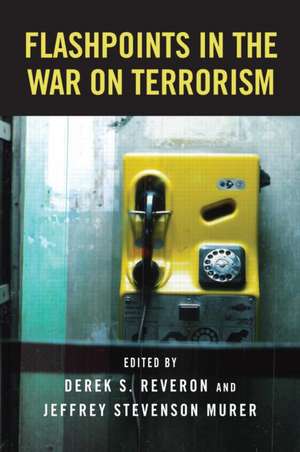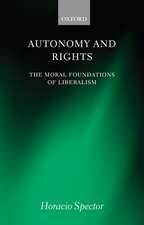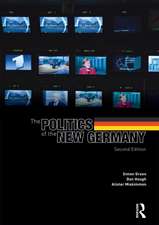Flashpoints in the War on Terrorism
Autor Derek S. Reveron, Jeffrey Stevenson Mureren Limba Engleză Paperback – 17 aug 2006
Preț: 329.32 lei
Preț vechi: 479.19 lei
-31% Nou
Puncte Express: 494
Preț estimativ în valută:
63.04€ • 68.49$ • 52.98£
63.04€ • 68.49$ • 52.98£
Carte tipărită la comandă
Livrare economică 21 aprilie-05 mai
Preluare comenzi: 021 569.72.76
Specificații
ISBN-13: 9780415954914
ISBN-10: 0415954916
Pagini: 296
Ilustrații: 14 halftones
Dimensiuni: 152 x 229 x 21 mm
Greutate: 0.73 kg
Ediția:1
Editura: Taylor & Francis
Colecția Routledge
Locul publicării:Oxford, United Kingdom
ISBN-10: 0415954916
Pagini: 296
Ilustrații: 14 halftones
Dimensiuni: 152 x 229 x 21 mm
Greutate: 0.73 kg
Ediția:1
Editura: Taylor & Francis
Colecția Routledge
Locul publicării:Oxford, United Kingdom
Cuprins
Section 1: The Near East 1. Israel-Palestine Stephen Van Evera 2. Iraq James S. Robbins 3. Kurdistan Kerrie Urosevich Section 2: Europe and the Post-Soviet Region 4. Kosovo Susan D. Fink-Yoshihara 5. Caucasus Jeffrey Stevenson Murer 6. The Fergana Valley of Central Asia Christopher J. Fettweis Section 3: Asia 7. Thailand Rohan Gunaratna and Arabinda Acharya 8. Indonesia Arabinda Acharya and Rohaiza Ahmad Asi 9. Kashmir Samina Raja 10. Philippines Toshi Yoshihara 11. Xinjiang Dru Gladney Section 4: Africa 12. Trans-Saharan Arc Stephen Emerson 13. Sudan Stephen Emerson 14. Nigeria Michael F. Morris and Charles Edel 15. Conclusion: Resolving Political Conflicts Jeffrey Stevenson Murer and Derek S. Reveron
Recenzii
"Flashpoints in the War on Terrorism is essential reading for anyone wishing to begin a detailed examination of terrorism. . . . Reveron and Murer enlist a diverse group of scholars, each of whom is an expert in one or more facets of terrorism. Each, in turn, brings considerable depth and experience to the project, offering the reader a much greater understanding of both the depths and complexities of current terrorist hotspots. In each chapter, the contributors offer well-written, . . . compelling overviews of the nature of the conflict, followed by their identification and discussion of current flashpoints, pivot points, and hotspots. . . . [T]he greatest strength of the work [is] offering in a concise and readable format a more balanced and in-depth assessment of the multitude of factors feeding militancy. . . . Murer and Reveron's concluding essay note[s] correctly that to understand terrorism we must examine in depth the variety and nuances of the myriad causal factors of conflict, that it is important to understand the specific cultural and environmental context in which it occurs, and that it is not a unitary "thing" that can be generalized and reduced to the least common denominator, as most government counterterrorism programs and policies seek—perhaps by design—to do."
--Defense Intelligence Journal
"Derek Reveron and Jeffrey Stevenson Murer provide a much-needed corrective to the spate of alarmist writings on the Islamist roots of terrorism. Their essential book should be subtitled, ‘The thoughtful person’s guide to political violence in the Islamic world.’ Fourteen country and regional studies show that most terrorist threats to the U.S. and regional security come from festering local conflicts in weak Muslim states, not from global jihad. While many activists claim an Islamic identity, their struggles mainly reflect nationalist goals and economic grievances. The U.S.-led ‘war on terrorism’ risks internationalizing these conflicts by pushing political militants into the eager arms of jihadists."
—Ted Robert Gurr, Distinguished University Professor, University of Maryland
"This outstanding and timely essay collection pinpoints the causes of political violence in a number of conflicts worldwide, and demonstrates the need to take a more nuanced and comprehensive approach to fighting terrorism. The authors offer insightful and practical recommendations for simultaneously combating terrorism and promoting democratic reforms."
—Karin Von Hippel, Senior Fellow, Center for Strategic and International Studies
"This volume represents a vital and comprehensive effort to understand the wide variety of local struggles that are often subsumed under the label ‘global war on terror.’ Collectively, the case studies present a formidable, empirically grounded challenge to the conventional wisdom that the United States is confronting a global Islamist movement. Anyone who wants to understand the ‘war on terrorism’ for what it is rather than for what we imagine it to be should read this book."
—Jeremy Shapiro, Research Director and Fellow, Center on the United States and Europe, The Brookings Institution
"Flashpoints in the War on Terrorism is essential reading for anyone wishing to begin a detailed examination of terrorism. . . . Reveron and Murer enlist a diverse group of scholars, each of whom is an expert in one or more facets of terrorism. Each, in turn, brings considerable depth and experience to the project, offering the reader a much greater understanding of both the depths and complexities of current terrorist hotspots. In each chapter, the contributors offer well-written, . . . compelling overviews of the nature of the conflict, followed by their identification and discussion of current flashpoints, pivot points, and hotspots. . . . [T]he greatest strength of the work [is] offering in a concise and readable format a more balanced and in-depth assessment of the multitude of factors feeding militancy. . . . Murer and Reveron's concluding essay note[s] correctly that to understand terrorism we must examine in depth the variety and nuances of the myriad causal factors of conflict, that it is important to understand the specific cultural and environmental context in which it occurs, and that it is not a unitary 'thing' that can be generalized and reduced to the least common denominator, as most government counterterrorism programs and policies seek--perhaps by design--to do."
--Defense Intelligence Journal
--Defense Intelligence Journal
"Derek Reveron and Jeffrey Stevenson Murer provide a much-needed corrective to the spate of alarmist writings on the Islamist roots of terrorism. Their essential book should be subtitled, ‘The thoughtful person’s guide to political violence in the Islamic world.’ Fourteen country and regional studies show that most terrorist threats to the U.S. and regional security come from festering local conflicts in weak Muslim states, not from global jihad. While many activists claim an Islamic identity, their struggles mainly reflect nationalist goals and economic grievances. The U.S.-led ‘war on terrorism’ risks internationalizing these conflicts by pushing political militants into the eager arms of jihadists."
—Ted Robert Gurr, Distinguished University Professor, University of Maryland
"This outstanding and timely essay collection pinpoints the causes of political violence in a number of conflicts worldwide, and demonstrates the need to take a more nuanced and comprehensive approach to fighting terrorism. The authors offer insightful and practical recommendations for simultaneously combating terrorism and promoting democratic reforms."
—Karin Von Hippel, Senior Fellow, Center for Strategic and International Studies
"This volume represents a vital and comprehensive effort to understand the wide variety of local struggles that are often subsumed under the label ‘global war on terror.’ Collectively, the case studies present a formidable, empirically grounded challenge to the conventional wisdom that the United States is confronting a global Islamist movement. Anyone who wants to understand the ‘war on terrorism’ for what it is rather than for what we imagine it to be should read this book."
—Jeremy Shapiro, Research Director and Fellow, Center on the United States and Europe, The Brookings Institution
"Flashpoints in the War on Terrorism is essential reading for anyone wishing to begin a detailed examination of terrorism. . . . Reveron and Murer enlist a diverse group of scholars, each of whom is an expert in one or more facets of terrorism. Each, in turn, brings considerable depth and experience to the project, offering the reader a much greater understanding of both the depths and complexities of current terrorist hotspots. In each chapter, the contributors offer well-written, . . . compelling overviews of the nature of the conflict, followed by their identification and discussion of current flashpoints, pivot points, and hotspots. . . . [T]he greatest strength of the work [is] offering in a concise and readable format a more balanced and in-depth assessment of the multitude of factors feeding militancy. . . . Murer and Reveron's concluding essay note[s] correctly that to understand terrorism we must examine in depth the variety and nuances of the myriad causal factors of conflict, that it is important to understand the specific cultural and environmental context in which it occurs, and that it is not a unitary 'thing' that can be generalized and reduced to the least common denominator, as most government counterterrorism programs and policies seek--perhaps by design--to do."
--Defense Intelligence Journal
Descriere
A comprehensive overview of international political violence bringing together foreign policy experts on several regions who examine conflicts in the Fertile Crescent, the Balkans, the Post-Soviet Region, the Himalayas, Southeast Asia, and sub-Saharan Africa.











